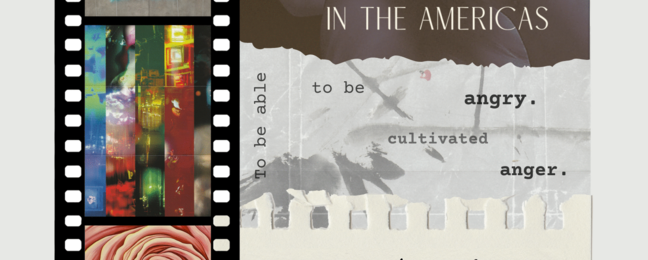
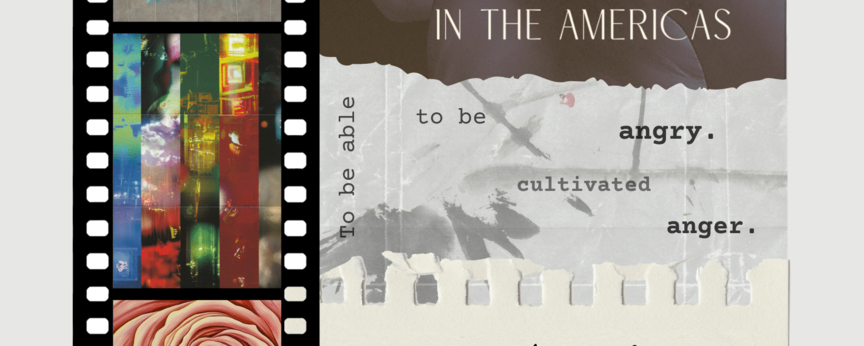
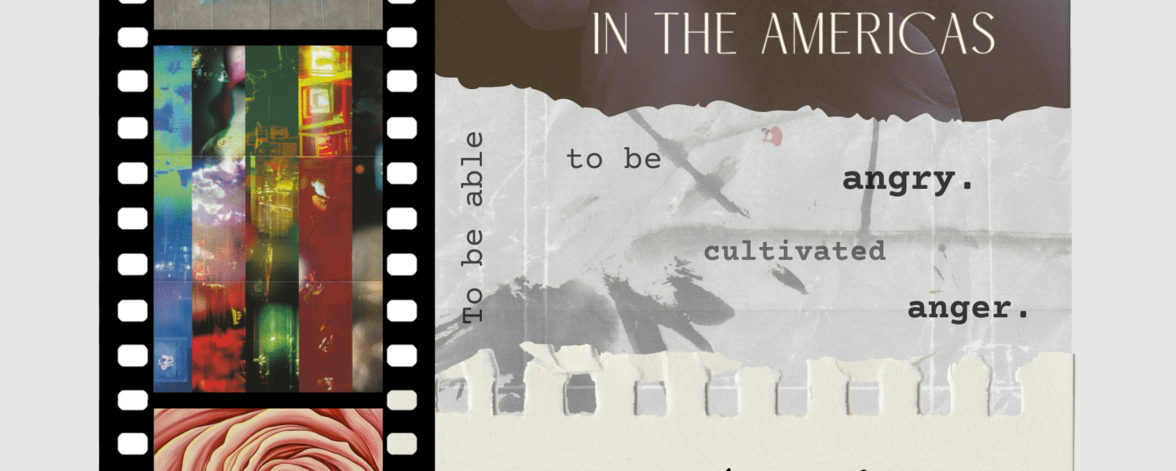
Introduction
The 33rd annual conference of the Postgraduate Forum (PGF) of the German Association for American Studies (GAAS/DGfA), took place at Leibniz Universität Hannover from November 9 to 11, 2023. Headlined by the theme “Spaces of Affect in the Americas” and organized by Stefan Dierkes, Katerina Steffan, and Lujain Youssef, the conference explored the intricate relationship between affect, identity, and spatiality in American Studies and aimed to create a unique gathering space for early-career researchers from across Germany and Europe. In addition to five panels with altogether eighteen academic presentations, the PGF team also organized social events, including a visit of the Kestner Gesellschaft and dinners for the conference participants.
Based on photos and video material that the In Progress editorial team 2023/2024 gathered at the PGF Conference “Spaces of Affect in the Americas,” Mandana Vahebi edited the following introductory video.
Day 1: Centering Marginalized Voices in Affect Studies
The first panel on “Centering Marginalized Voices in Affect Studies” began with three speakers. Natalie Erkel, who holds master’s degrees in Education, North American Studies, and English Language from the University of Göttingen, and is currently a PHD student and a research assistant at the Ruhr-Universität Bochum (RUB), gave a talk on Rivers Solomon’s novella, The Deep. The presentation examined the aspects of affect, emotion, and memory in a modern utopia that envisions an aquatic community formed by enslaved African women, deconstructing colonial perspectives, and empowering the historically silenced. Erkel argued that the conventions of literary utopia are implemented in The Deep to negotiate the question of belonging, to navigate between dimensions of time, and to provide a space for giving voice to trauma and the slave trade.
Then, Arunima Kundu (FAU Erlangen-Nürnberg) used her talk on “Affective Worldmaking and Counterpublic(s): Afrofuturism and Planetary Posthuman Critique in NK Jemisin’s The City We Became” to examine how Jemisin’s science-fiction novel engages with issues of race, otherness, and blackness in North America and the United States, using the notion of the planetary posthuman as a theoretical frame.
The next presentation, by Can Aydin from the Technical University of Dresden, explored the theme of shame in Billy Ray Belcourt’s collection of essays A History of My Brief Body. In doing so, Aydin focused on the shame of the queer Indigenous subject in public spaces, particularly medical institutions. The narrative of A History of My Brief Body, which unfolds after a troubling sexual encounter that leaves the narrator fearful of a possible HIV infection, reveals the vulnerability of the subject when queerness and Indigeneity intersect. As the narrator is denied the empathetic support needed to overcome shame by indifferent active agents in the healthcare system, this situation leads to feelings of abandonment.
Keynote Address by Anne Potjans (Humboldt-Universität zu Berlin)
Following the first panel, Anne Potjans fom Humboldt-Universität zu Berlin delivered the conference keynote address, entitled “The Sound of Anger: Black Feminist Frequencies,” in which she explored the intersection of anger, racial oppression, and inequality in the inner lives of Black people. Focusing on the aftermath of colonialism and slavery, Potjans discussed Black anger as an important affective element of historical consciousness, shaped by the convergence of gendered and rationalized structures of oppression in which Black women’s emotional lives and responses are misrecognized and distorted. In her keynote, Potjans highlighted the important role of anger and rage in U.S. social movements and argued that Black anger, grief, and rage deserve space for articulation because of their transformative potential. However, according to Potjans, these articulations are often limited by mainstream sensibilities regarding the public expression of emotions, particularly for Black people. Thus, Potjans’s argument built on the intersectional question of who is allowed to express anger and rage in public spaces.
Drawing on white feminist discourses since the 1960s, Potjans furthermore discussed the strategic use of madness and anger as tools against patriarchal structures. Noting that racialized traits were often associated with these expressions, Potjans pointed out that the use of color symbolism implied a connection between race, emotion, mental illness, and emotional excess. Potjans then examined the intersectionality of black women’s experiences, focusing specifically on the emotion of anger. Stereotypes play a role in shaping public perceptions of black emotions, imposing anti-black stereotypes on these emotions before real understanding can occur. The control of black emotions, particularly anger, thus becomes a tool for maintaining social inequality, which is why links are drawn to the criminalization of black hoodies and the perpetuation of harmful ideologies. In this context, Potjans highlighted how the alleged hyper-emotionality attributed to black people contributes to their dismissal and trivialization, thus reinforcing historical narratives that label black suffering as an overreaction. Even before meaningful engagement can take place, black feminist anger is often judged, dismissed, and pathologized, Potjans explained, which is why it is arguable that the denial of anger, particularly for black women, is seen as a way of negatively connoting their relationship to the human, which is often described as white, heterosexual, and male.
Potjans also explored the intersection of madness and Blackness, moving on to an analysis of the creative expression of anger in the music of Black feminist artist Angel Haze. Discussing two songs, “Wicked Moon” and “The Wolves,” which create a threatening atmosphere and convey a sense of internalized violence, Potjans argued that Haze adopts a hypermasculine persona to articulate her emotions and navigate the oppressive structures of society. In the Q&A following Anne Potjans’s keynote address, questions were raised about the political impact of anger and its empowering potential. It is important to recognize anger as a multifaceted emotion and to create spaces where it can be cultivated and expressed. In the case of Angel Haze, music shows that anger can be invoked and ritualized through the transformative space of the stage. The keynote thus highlighted the challenging and limited frameworks that define acceptable forms of anger through the medium of music and explored anger as a complex emotion within the theme of Black Feminist Frequencies.
Excursion to the Kestner Gesellschaft
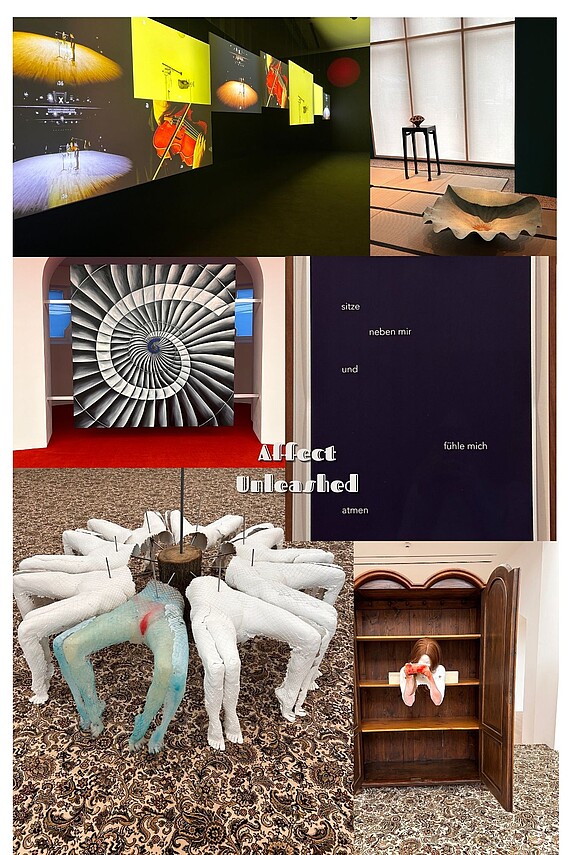
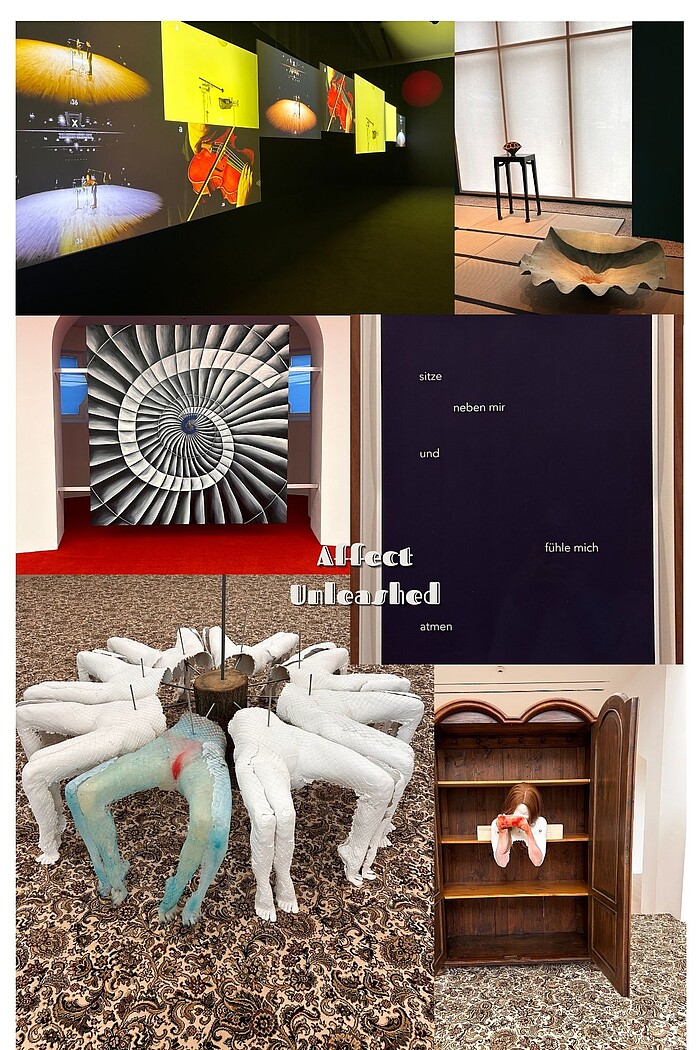
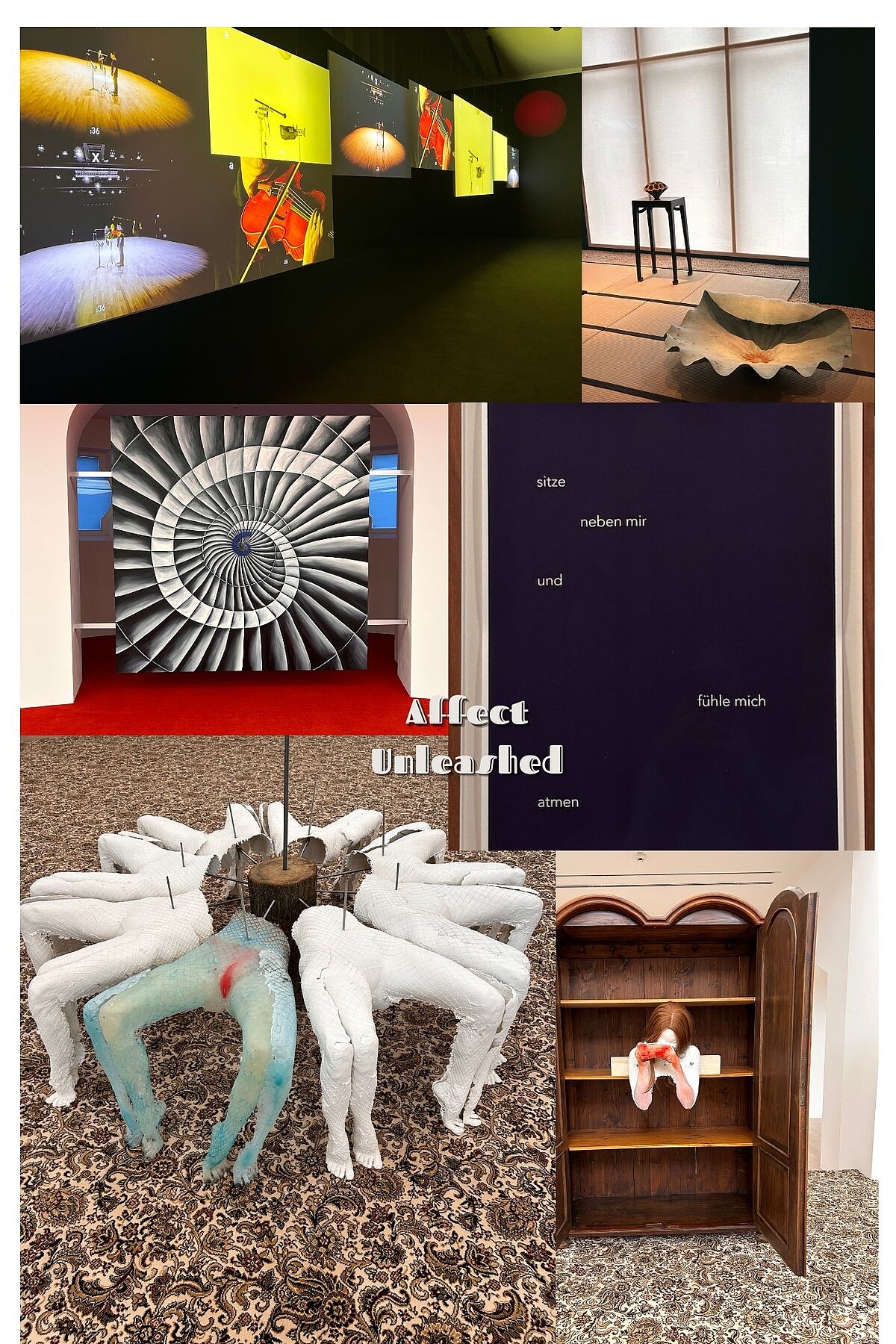
On the second day, the conference team had organized an excursion to the Kestner Gesellschaft. Three main exhibitions were on display at the museum: Rebecca Ackroyd’s Period Drama, A World of Dew, and in Every Drop of Dew, a World of Struggle from the collection of Dr. Christiane Hackerodt and Art and Culture Foundation, and Samson Young’s Situated Listening.
Period Drama is Rebecca Ackroyd’s first institutional solo exhibition in Germany. It explores both the physical and the mystical, the real and the unseen. Ackroyd’s works resemble apocalyptic fantasies yet are grounded in a sense of reality, undertaking a critical exploration of the human body, subconsciousness, and the spatial dimensions of sexuality. In her detailed examination of femininity and spirituality, Ackroyd blends audacity with vulnerability, seduction with repulsion. Abstract and surreal elements flow together in her art, creating a mysterious language – one that is informed by her fascinating and unpredictable use of diverse materials such as wooden furniture, resin, mechanical parts, and plaster, which come together in complex installations and sculptures that resemble (parts of) human bodies.
In a marked difference to Ackroyd’s works, the collection A World of Dew, and in Every Drop of Dew A World of Struggle delved into traditional Japanese scroll paintings from the last five centuries, aiming to bridge East and West by exploring Zen Buddhism, as well as Japanese house traditions and ceremonies. Before entering the room, visitors were required to remove their shoes to truly feel the touch of the bamboo floor from Japan. The exhibition featured over 40 Japanese scroll images with a focus on the seasons and the most popular natural motifs – landscapes with flowers and animals, emphasizing the fragility of nature and its association with human beings. This exhibition also featured more recent art, including sculptural works by Japanese artist Morio Nishimura, which deepened the dialogue between past traditions and today’s contemporary practices. Overall, the exhibition of pieces from the Hackerodt collection thus managed to provide a holistic experience that surpassed the temporality of the here and now.
The concluding exhibition was Samson Young’s aesthetically precise Situated Listening, which created spaces that mix sound and images in different ways. The Travelers and the Listeners, for instance, is a collage of six musical films based on Walter de la Mere’s short poem, “The Listeners” (1912) that used image negatives and sound design to evoke impressions of ghosts and phantoms behind a locked door, revealing the hidden and the unseen. By contrast, Young’s sound and video installation Variations of 96 Chords in Space (feat. William Lane) consists of 96 colors converted into a chord by a computer program that follows a pattern most of the time, but sometimes it does things randomly based on the similarity of the colors. In more than one way, the meticulous preparations showcased in all three exhibitions thus resonated nicely with the conference’s scholarly explorations of affect theory.
Day Two: (Em)Bodied Affects
On the second day, the panels were devoted to the cross-section of affects and physical experience. The term “embodied affects” indicates that emotions are not only experienced mentally but also have a physical basis, emphasizing that emotions and affects are not just abstract feelings but are connected and manifested in the body. The presentation by Judith Schreier, a PhD student at Humboldt University of Berlin, turned our attention to the genre of fat life writing. Focusing on Aubrey Gordon’s You Just Need to Lose Weight and 19 Other Myths about Fat People, Schreier explored the genre’s relation to self-help literature. She argued that Gordon’s book serves as a call to action, providing the reader with facts to challenge misconceptions surrounding body weight. By criticizing the societal judgment and prejudices against obesity, Gordon’s book opposes the conventional notions of self-help, offering a more emotionally active and motivating call-for-action book, Schreier argued. She then went on to show how Gordon creates a unique narrative that combines the intellectual and the personal by moving back and forth between academic theory and personal experience, exploring themes related to body image, societal perceptions of weight, and discrimination based on body size. Schreier’s talk concluded by acknowledging Gordon’s contribution to the genre of fat life writing and her impact on perceptions, identity, and activism.
Nadine Walter, a third-year doctoral student in the interdisciplinary, DFG-funded research training group (Graduiertenkolleg) “Power of Interpretation” (Deutungsmacht) at the University of Rostock, followed with her talk titled “Claiming the Abortion Narrative: Trajectories of Feminism in Glennon Doyle’s Writing.” An author, speaker, and activist, Glennon Doyle’s perspective on abortion is worthy of examination. On June 24, 2022, the U.S. Supreme Court revoked Roe v. Wade, a landmark decision that had legally guaranteed access to abortion in the United States since 1973, ushering in a new crisis for women’s rights. This decision immediately started debates on the current state of women’s rights. Doyle, who identifies as evangelical, weaves her personal experiences, including her abortion, into her narrative to defy conservative evangelical ideals on abortion. As Walter showed in her talk, this is particularly palpable in Doyle’s memoir Untamed, in which she examines social hierarchy and power dynamics in relation to sexuality. The primary goal of Doyle’s book is to actively and intentionally alter the way individuals perceive and understand abortion, striving to challenge preconceived notions and promote a more open-minded point of view of the issue. According to Walter, Doyle’s journey, her critique of evangelical abortion narratives, and her attempts to change societal expectations about abortion illuminate her powerful role in reshaping conversations about reproductive rights and traditional gender norms.
Nina Marie Voigt, a PhD student at the University of Heidelberg, was the next speaker at the conference and presented a paper entitled “‘Except for the Hysteria, She’s the Perfect Wife’: Women and Medicalization in An Inconvenient Wife,” which focused on the portrayal of medical discourses surrounding women in Amy McKey’s 2009 novel of the same name. In McKey’s novel, newly married woman from New York’s high society at the end of the nineteenth century is diagnosed with both hysteria and infertility and subjected to medical treatments. Going through several procedures to conform to the expectations of the society as an ‘acceptable’ wife, the protagonist’s arc, Voigt pointed out, constitutes a forceful representation of how medicalization both molds individual experiences and highlights larger issues regarding women’s autonomy and identity. Opting for a Foucauldian approach to analyze the novel’s depiction of gendered emotions and medicalization, Voigt effectively showcased how the novel comments and reflects on issues for both the past and the socio-cultural landscapes of the present, including historical constructions of hysteria, their relation to female bodies, and the repercussions of labeling a woman as hysterical based on her gender.
Next, Maria Menzel from the University of Amsterdam gave a talk on “Animated Bodies: The Worker’s Body as a Space of Affect in Sorry to Bother You.” She examined the representation of different forms of animatedness within the context of the film Sorry to Bother You (Boots Riley, 2018). Focusing on the concept of animatedness as a minor affect, Menzel analyzed the liveliness, strength, or dynamism associated with various characters and elements in the film, exploring the ways in which affect and attachment are connected or ‘stick to’ certain entities through ‘histories of contact.’ Drawing on the work of Sara Ahmed and others, Menzel argued that the subjectivities of the workers in the film are shaped by their work – and that the film uses techniques such as Claymation and animatronics to present a nightmarish image of the flexible and productive worker. Making a connection between Sorry to Bother You’s human-horse hybrid workers (the so-called Equisapiens) and the historical exploitation of people of color, as well as the history of slavery in the US, Menzel convincingly pointed out that the film draws comparisons between the exploitation of the workers’ bodies and previous injustices endured by marginalized communities.
Day Three: Emotional Landscapes



The last day of the conference consisted of three panels: “Exploring the Emotional Landscape,” “Crossing Boundaries of Space, Body, and Genre,” and lastly “Queering Affect: Exploring Emotional Landscapes in Queer Studies.” The first speaker was PhD student Julia Machtenberg from Ruhr-Universität Bochum with a talk on “‘This dream of water – what does it harbor?’: Agha Shahid Ali’s Affective Re-Mapping of the Americas.” Machtenberg argued that Ali’s poetry collection “A Nostalgist’s Map of America” (1991) constructs “affective landscapes” through the depiction of vulnerable states which are emphasized through reimagining the United States as a landscape that transgresses conventional bounds. Next, Sandra Meerwein, a PhD candidate from Johannes Gutenberg University Mainz, presented on “Perceptions of Space: The Effect of Socio-Political Geography on Foreign Policy in the Pacific.” Her closing statement on the talk was that this topic deals with a prominent discrepancy as the Navy is a heavy polluter of the Pacific but is protected due to their role as peacekeepers. Moving away from the Pacific Ocean, Philip James Grider from the University of Göttingen then gave a talk entitled “‘A Vast and Howling Wilderness’: Otherness in the Early American Landscape” that discussed wilderness as a source of anxiety for European settlers who viewed the indigenous presence as hauntingly present within or dissolved into the American landscape.
The next panel started with PhD candidate Wesley Moore from the FAU Erlangen-Nürnberg, who analyzed Ben Lerner’s novel Leaving the Atocha Station (2011) with regards to digital space and representations of death and trauma and concluded with the fascinating observation that death is erased from life by its repeated representation in the media. Franziska Wolf, who is a PhD student at Heinrich Heine University Düsseldorf presented on “Mattered Being: Beauty is Only the Raw Material of Success.” Wolf focused on Edith Wharton’s novel The House of Mirth, where the protagonist loses all but her beauty and, therefore, the nucleus around which her life is rebuilt. According to Wolf, Wharton’s novel thus reframes human (female) physicality as a form of capital that must be groomed and well looked after to be maintained. The following talk was held by Franz Liebster, a PhD candidate at the University of Tübingen. Focusing on the poetry and literary criticism of John Berryman, Liebster discussed Berryman’s reading of affect in Keats’ Letters. Susen Halank from the University of Bamberg gave the last talk of the panel, “A Soul’s Release: Elizabeth Bishop and Lauren MacIver – Friendship, Anxiety, and Emotional Correspondence.” Halank analyzed selected letters written by Elizabeth Bishop to her friend Loren MacIver, showcasing her complicated and slow process of writing poetry whilst describing vivid emotions in prose about everyday life, anxieties, and alcoholism.
The final panel began with Corina Wieser-Cox, a PhD student at the University of Bremen, and her talk on “Desire and Intimacy During Doomsday: Indigiqueer & 2Spirit Apocalypses in Love After the End (2020).” Focusing on the intersection of apocalyptic fiction and the futurism of 2Spirit and Indigiqueer authors collected in the short story anthology Love After the End, Wieser-Cox emphasized that apocalypse does not necessarily mean one large event but might also refer to several smaller world endings. According to Wieser-Cox, the central concerns of Love After the End cluster around the questions of how apocalypses are created and survived, who calls an event apocalyptic, and who must be affected by it for it to be referred to as “canon.” In her conclusion, Wieser-Cox turned to the issue of survival strategies, suggesting that Love After the End lobbies against the abandonment of relationships and situations in times of crisis, and for shared responsibilities, reciprocity, and attempts to stay and fix what is broken. Johanna Kluger from Rheinische Friedrich-Wilhelms-Universität Bonn then gave a talk entitled “Beyond Hero and Heroine: Queering the Popular Romance Novel Protagonist.” Kluger introduced the genre of the romance novel and its obligatory ‘happily ever after ’ ending. According to Kluger, queer romance shares many of the same features with other types of romance fiction but includes at least one explicitly non-cis-heterosexual protagonist; importantly, it furthermore co-opts or redefines the happy ending in terms of coming out, marriage, or children. The final contribution to the conference was made by TU Dresden’s Laura Handl, whose talk “Affecting from the Margins: Politics of Trauma Disclosure in Queer Manifesto Memoirs” focused on a genre of manifesto-style literature that has become increasingly popular since 2015. In particular, Handl zoomed in on manifestos by queer activists who incorporate of negotiations of trauma to increase their purchase within contemporary political discourses.
The three days of the conference included exciting insights and interesting topics that left participants eager to delve deeper into the spaces of affect. Each panel was filled with interesting research questions, insights, and conclusions, and the lively discussion at the end of each talk attested to the enthusiasm and enjoyment of all present. Covering a wide range of topics that clustered around the inclusion of marginalized voices as well as the notions of embodied affects, emotional landscapes, and affective boundaries, the 2023 PGF conference thus left its participants with the best kind of feeling that an event such as this can provide: that of having learned something, of having been in the presence of exceptionally smart people – and, above all, of having had a really good time.
Author Biographies
Simge Irmak Çinar is currently pursuing a master’s degree in North American studies at Leibniz University Hannover. She holds a bachelor’s degree in English Language and Literature from Kocaeli University in Turkey. Her areas of research interest are wide-ranging and include media and cultural studies, as well as the intersection of postcolonialism and gender studies. She currently takes part in In Progress’ editorial board as an associate editor. Through her contributions, she aims to engage readers with insightful perspectives and encourage cross-disciplinary communication.
Holly Fischer is in the final steps of pursuing her master’s degree in North American Studies at Leibniz University Hannover. She graduated from Rheinische-Friedrich-Wilhelms Universität in Bonn with a bachelor's degree in English Studies. She is currently a member of the In Progress Editorial Board at Leibniz University.
Ioana-Marina Pantelici is currently pursuing a dual master’s degree in North American Studies and Education. She holds an interdisciplinary bachelor’s degree in English and History with a specialization in Education. Her research interests are varied and cover graphic novels, immigrant literature, and short stories. She is currently involved with In Progress through the Independent Studies module and plans to join the editorial board in the coming semester. Through her contributions, she aims to engage readers with varied perspectives while gaining a deeper understanding of the editorial process of an academic journal.
Mandana Vahebi is currently pursuing a master’s degree in the division of North American Studies at Leibniz University Hannover. She holds a bachelor’s degree in English Language and Literature from Arak University, Iran. Her academic interests span a wide range of fields, including cultural studies, transnationalism, poetics, affect studies, and media, film, and communication. In her current role as associate editor at the In Progress journal at Leibniz University Hannover, Mandana has applied her specialized skills in video essay creation to supply compelling and informative video content in the journal’s latest issue.
Copyright (c) 2024 Holly Fischer, Ioana-Marina Pantelici, Simge Irmak Çinar, and Mandana Vahebi. This work is licensed under a Creative Commons Attribution 4.0 International License.


